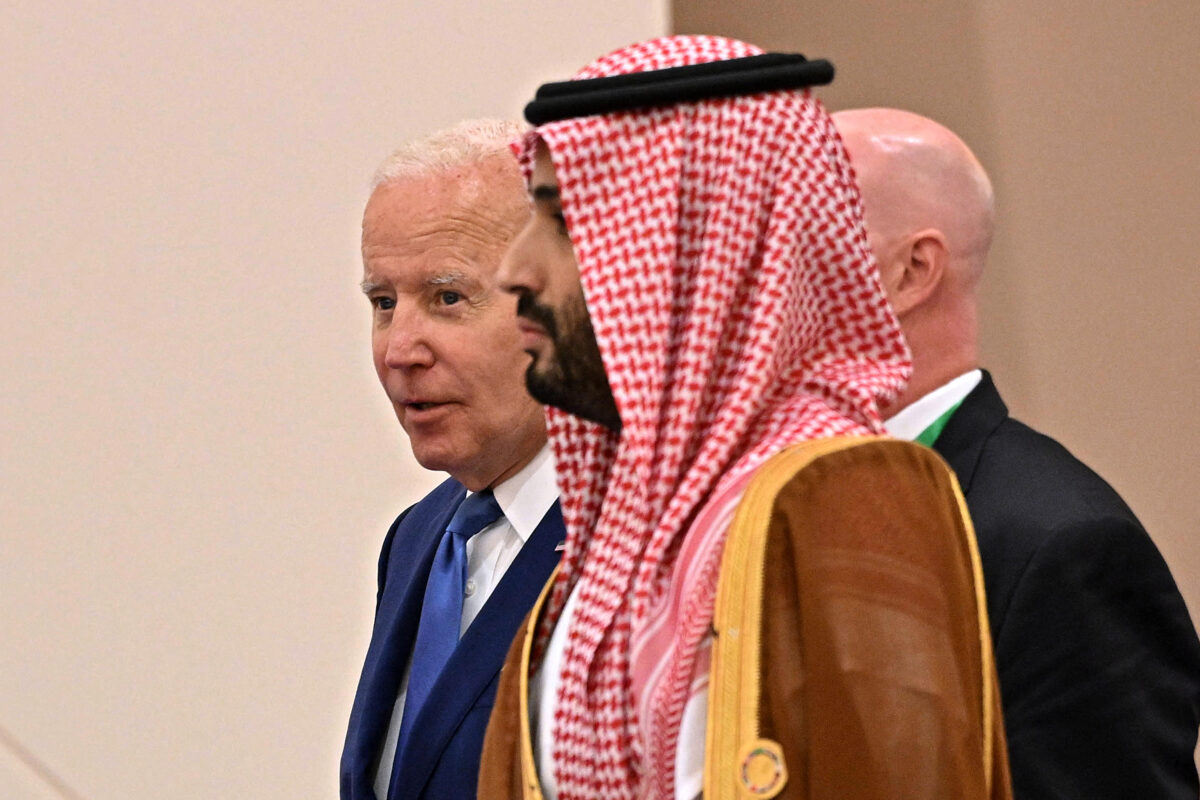US Position on Syria Deteriorates
Commentary The U.S. position in the Middle East is weakening quickly. Nowhere is this more obvious than in Syria, where a pro-Russian dictator has waged a brutal civil war against his people with increasing impunity. On May 9, Syria and Saudi Arabia announced they would reopen their embassies in each others’ countries. Previously, the Saudis, who were long-time U.S. allies, had supported groups in Syria attempting to overthrow the country’s strongman, Basher al-Assad. Egypt and Jordan are also normalizing relations with Syria, which Bahrain and the United Arab Emirates (UAE) have long advocated. Saudi Arabia, the UAE, and Egypt are the most influential Arab countries. After years of atrocities—including up to hundreds of chemical attacks against Syrian civilians, ongoing Iran-backed attacks on U.S. troops in Syria, and devolution of the country to a narco-state in which the Assad family and associates allegedly sell up to tens of billions of dollars worth of illegal amphetamines regionally—the Arab League has invited Damascus to rejoin its ranks. This “rehabilitation” of Syria goes beyond the Arab world. On May 10, the Syrian foreign minister met his counterparts from Turkey, Iran, and Russia in Moscow. Turkey is supposed to be a NATO ally, yet it is getting increasingly close to Russia. Assad and his ally Vladimir Putin are responsible for brutality in the Syrian civil war in which over 300,000 have died and over half of the population is displaced. Now, Syrian refugees fear forced repatriation back to Syria in violation of international law. Countries like Turkey, host to 3.6 million Syrian refugees, and Jordan, the main transshipment hub for Syria’s illegal trade in “Captagon” amphetamines, are apparently appeasing Syria’s state terror to try and get these problems solved. Yet appeasing bullies has historically just led to their greater demands. According to NATO in 2016, Putin and Assad used air strikes, including barrel bombs, to terrorize the Syrian population into flight, thus weaponizing refugees to overwhelm European structures and resolve. U.S. President Joe Biden and Saudi Crown Prince Mohammed bin Salman (front) arrive for a photo during the Jeddah Security and Development Summit (GCC+3) at a hotel in Saudi Arabia’s Red Sea coastal city of Jeddah on July 16, 2022. (Mandel Ngan/AFP via Getty Images) The Saudis are rewarding state terror and illegal drug dealing at scale by inviting the Syrian dictator to the Arab League summit in the Saudi city of Jeddah on May 19. Saudi Arabia, which used to be the staunchest of U.S. allies and an adversary of the Mullahs in Iran, is normalizing relations with not only Syria, but also Iran and improving relations with China. President Joe Biden is encouraging this “rehabilitation” of Damascus, according to The Washington Post. The United States is apparently impotent in the Middle East after Biden framed world politics publicly as a fight of democracies versus dictators. That left our long-time allies in Saudi Arabia out in the cold. Biden further alienated the Saudis by failing to retaliate against Iran for its many transgressions, including Iran-backed missile strikes against Saudi Arabia, and U.S. troops in Iraq and Syria. Riyadh is rapidly concluding that the United States is an unreliable ally. U.S. weakness in defending Ukrainian, Afghan, Taiwanese, and Philippine friends and allies also makes the point. Part of the United States’ global weakening is due to American economic problems, including inflation, the risk of recession, and talk of a sovereign debt default. The weaker the U.S. economy, the weaker our military becomes in maintaining American interests in the Middle East, including against nuclear proliferation by Iran, terrorism, and any impediments to the free flow of oil and gas. Without access to cheap energy, the U.S., EU, Japanese, and allied economies weaken further, in a self-perpetuating downward spiral for democracies globally. Ukraine lost territory to Russia during the Biden administration, which was a costly and risky gambit to push Russian soldiers back across their border. Despite talk of decoupling from China, U.S. trade with the totalitarian country in 2022 was at an all-time high of $690 billion. U.S. trade dependency on China is seen globally as a political weakness. The Chinese Communist Party welcomes Syria’s reentry into the Arab League, which increases Beijing’s influence in the Middle East. The CCP now has easier access to multiple levers to influence not only Iran, but also Arab politics. Biden’s history of trying too hard to be Mr. Nice Guy, bumbling the withdrawal from Afghanistan, and ignoring the Middle East as dictators link up with each other is failing. Dictators around the world—including in Beijing, Moscow, Tehran, Riyadh, and Damascus—are responding to perceived U.S. weakness by closing ranks against us. Expect Moscow and Beijing to expand into the power vacuum that Washington is leaving behind,

Commentary
The U.S. position in the Middle East is weakening quickly. Nowhere is this more obvious than in Syria, where a pro-Russian dictator has waged a brutal civil war against his people with increasing impunity.
On May 9, Syria and Saudi Arabia announced they would reopen their embassies in each others’ countries. Previously, the Saudis, who were long-time U.S. allies, had supported groups in Syria attempting to overthrow the country’s strongman, Basher al-Assad.
Egypt and Jordan are also normalizing relations with Syria, which Bahrain and the United Arab Emirates (UAE) have long advocated. Saudi Arabia, the UAE, and Egypt are the most influential Arab countries.
After years of atrocities—including up to hundreds of chemical attacks against Syrian civilians, ongoing Iran-backed attacks on U.S. troops in Syria, and devolution of the country to a narco-state in which the Assad family and associates allegedly sell up to tens of billions of dollars worth of illegal amphetamines regionally—the Arab League has invited Damascus to rejoin its ranks.
This “rehabilitation” of Syria goes beyond the Arab world. On May 10, the Syrian foreign minister met his counterparts from Turkey, Iran, and Russia in Moscow. Turkey is supposed to be a NATO ally, yet it is getting increasingly close to Russia.
Assad and his ally Vladimir Putin are responsible for brutality in the Syrian civil war in which over 300,000 have died and over half of the population is displaced. Now, Syrian refugees fear forced repatriation back to Syria in violation of international law.
Countries like Turkey, host to 3.6 million Syrian refugees, and Jordan, the main transshipment hub for Syria’s illegal trade in “Captagon” amphetamines, are apparently appeasing Syria’s state terror to try and get these problems solved. Yet appeasing bullies has historically just led to their greater demands.
According to NATO in 2016, Putin and Assad used air strikes, including barrel bombs, to terrorize the Syrian population into flight, thus weaponizing refugees to overwhelm European structures and resolve.

The Saudis are rewarding state terror and illegal drug dealing at scale by inviting the Syrian dictator to the Arab League summit in the Saudi city of Jeddah on May 19.
Saudi Arabia, which used to be the staunchest of U.S. allies and an adversary of the Mullahs in Iran, is normalizing relations with not only Syria, but also Iran and improving relations with China.
President Joe Biden is encouraging this “rehabilitation” of Damascus, according to The Washington Post. The United States is apparently impotent in the Middle East after Biden framed world politics publicly as a fight of democracies versus dictators. That left our long-time allies in Saudi Arabia out in the cold.
Biden further alienated the Saudis by failing to retaliate against Iran for its many transgressions, including Iran-backed missile strikes against Saudi Arabia, and U.S. troops in Iraq and Syria. Riyadh is rapidly concluding that the United States is an unreliable ally. U.S. weakness in defending Ukrainian, Afghan, Taiwanese, and Philippine friends and allies also makes the point.
Part of the United States’ global weakening is due to American economic problems, including inflation, the risk of recession, and talk of a sovereign debt default. The weaker the U.S. economy, the weaker our military becomes in maintaining American interests in the Middle East, including against nuclear proliferation by Iran, terrorism, and any impediments to the free flow of oil and gas. Without access to cheap energy, the U.S., EU, Japanese, and allied economies weaken further, in a self-perpetuating downward spiral for democracies globally.
Ukraine lost territory to Russia during the Biden administration, which was a costly and risky gambit to push Russian soldiers back across their border. Despite talk of decoupling from China, U.S. trade with the totalitarian country in 2022 was at an all-time high of $690 billion. U.S. trade dependency on China is seen globally as a political weakness.
The Chinese Communist Party welcomes Syria’s reentry into the Arab League, which increases Beijing’s influence in the Middle East. The CCP now has easier access to multiple levers to influence not only Iran, but also Arab politics.
Biden’s history of trying too hard to be Mr. Nice Guy, bumbling the withdrawal from Afghanistan, and ignoring the Middle East as dictators link up with each other is failing.
Dictators around the world—including in Beijing, Moscow, Tehran, Riyadh, and Damascus—are responding to perceived U.S. weakness by closing ranks against us.
Expect Moscow and Beijing to expand into the power vacuum that Washington is leaving behind, and use the increasingly coordinated Arab dictators to their advantage in the near future.
There is one bright spot in the Middle East. Qatar, Kuwait, and Morocco are still against restoring diplomatic ties with Syria. These are the Arab countries that the United States should reward with improved relations.
Views expressed in this article are the opinions of the author and do not necessarily reflect the views of The Epoch Times.












